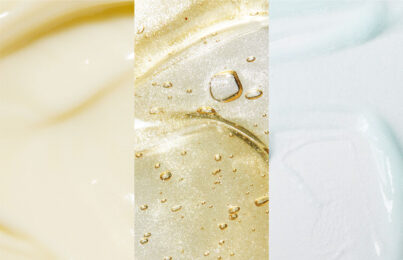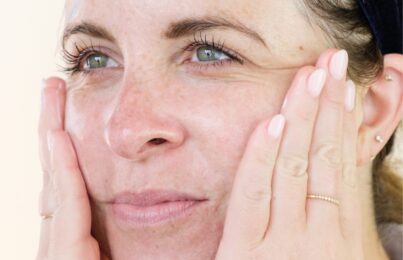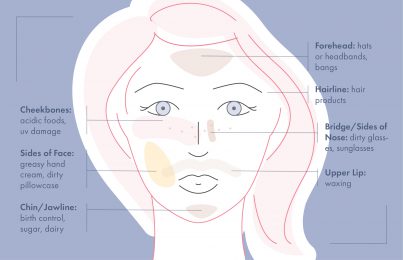Updated 05/24/22. If you’re a regular reader of my blog or you’re familiar with my skincare line, then you already know that I believe one size does NOT fit all when it comes to skin, and there is so much more than just dry, normal, and oily skin types. Working hands-on as an esthetician taught me that most people have complex skin and deal with multiple concerns at once. You might have breakouts and fine lines, or sun damage and sensitivity. Unfortunately, most skincare lines only address one skin issue—often to the detriment of the other. To solve this problem, I created my signature 9 Skin Types.
- 5 Common Mistakes People Make When Determining Their Skin Type
- Mistake #1: Focusing on One Concern Rather than Looking at the Big Picture
- Mistake #2: Thinking That Dry and Dehydrated Skin Are the Same Thing
- Mistake #3: Focusing on What Your Skin Was Like in the Past
- Mistake #4: Treating All Blemishes the Same Way
- Mistake #5: Misunderstanding the True Meaning of Sensitive Skin
- The Solution for Determining Your True Skin Type
You can take an easy Skin Type Quiz to determine which one you fall into. However, sometimes people answer questions incorrectly, which can lead them to the wrong result. In this post, I’ll walk through five of the most common mistakes people make when determining their skin type. I’ll also explain how to avoid these mistakes in order to get the most accurate result.
5 Common Mistakes People Make When Determining Their Skin Type
Mistake #1: Focusing on One Concern Rather than Looking at the Big Picture
It’s easy to become hyper-focused on one or two things that are happening with your skin instead of focusing on ALL of your skin’s needs. It’s totally normal. After all, certain things tend to bother us more than others. However, this can cause a problem when determining your true skin type.
Here’s an example: a 35-year-old woman experiences occasional hormonal breakouts that seem to appear out of nowhere, so she thinks she has an acne-prone skin type (understandably so). She will then purchase breakout-fighting products to go to work on her “problem skin.” However, most breakout-fighting products are harsh and drying, which will likely leave her skin flaky and irritated. Not only that, but these products won’t address her other skin concerns, such as preventing discoloration and signs of aging. To top it all off, traditional breakout-fighting products don’t work on hormonal acne. So, not only is she becoming frustrated at the lack of results, but she’s also compromising the health and integrity of her skin.
When people experience breakouts, it’s often the only thing they see in their skin. It’s important to take into consideration how often you’re breaking out and whether this is really your top (or only) skin concern. Many of the 9 Skin Types address breakouts, but they do so while balancing other skin concerns. Even my breakout-focused products, such as the Rapid Response Detox Masque and Anti Bump Solution, never dry out the skin, which is a common issue when it comes to treating adult acne.
Mistake #2: Thinking That Dry and Dehydrated Skin Are the Same Thing
Some people might think there’s no difference between dry and dehydrated skin, when, in reality, there’s a major difference. Let me explain. Dry skin means there is little to no oil being produced, which can leave the skin looking rough and flaky. To remedy this, oil-based products are needed to replenish moisture levels. In this way, dry skin is fairly straightforward.
Dehydrated skin, on the other hand, can be a bit more difficult to understand. When the skin is dehydrated, it means there isn’t enough water (as opposed to oil). This leaves the skin feeling tight. The problem is that some people associate this tight feeling with dryness, so they start using oil-based products that are too heavy for their skin, which can lead to breakouts. For dehydration, you want to use light, water-based products with humectants like sodium hyaluronate, trehalose, sodium PCA, and glycerin to restore the water content within skin cells (check out a list of 7 skincare ingredients that can actually hydrate your skin). Keep in mind that ALL skin types need water, so someone with dry skin can be dehydrated, too.
Watch this video to see what dehydrated skin looks like. It shows the skin of one of my clients (who is a Skin Type 2). Her skin became severely dehydrated after using too many exfoliants.
Mistake #3: Focusing on What Your Skin Was Like in the Past
While the emotional scars (not to mention physical scars) of chronic breakouts can take a long time to heal, it’s important to care for your skin according to what it needs right now—not according to what it did a number of years ago. I understand how easy it is to get into the habit of using breakout-focused products. You don’t want to stop using them for fear your breakouts will come back, right? I’m here to tell you that your skin evolves over time, so your skincare routine should, too.
Mistake #4: Treating All Blemishes the Same Way
Sometimes, people mistake certain types of bumps for breakouts, and they will squeeze them or use harsh products on them when there is no infection present. This will be unsuccessful, of course. They also treat all breakouts the same, whether they’re experiencing whiteheads, blackheads, pustules, papules, and cysts. The reality is that you need to treat each one accordingly, and you need to understand the life cycle of a blemish to do so.
Mistake #5: Misunderstanding the True Meaning of Sensitive Skin
When asked if they have sensitive skin, most people will say yes. They think their skin is sensitive because they get blemishes when they use a heavy moisturizer or their skin gets red and irritated when they use harsh, drying products (of course you’ll experience sensitivity if you use something too strong!). The truth is that these things can happen to any skin type and they don’t necessarily mean you have sensitive skin.
True indicators of sensitive skin are as follows: your skin gets red, hot, and flushed from showers, exercise, and even skincare products. Your skin gets a rash or irritation, even when gentle products are used. You have been diagnosed with rosacea, perioral dermatitis, eczema, or dermatitis. If you have one or more of these, you may have a true sensitive skin type (did you know there are four types of skin sensitivity?).
The Solution for Determining Your True Skin Type
So, where does this leave you in your quest to determine your true skin type? Start by taking this short Skin Type Quiz. If you’re not sure about the results or you don’t think your skin type sounds like you, check out these skin type videos, in which I give an in-depth explanation of each skin type.
The important thing here is, that if you’re confused about your skin, don’t go it alone. Put your skin in the hands of a trusted professional who can help you determine your true skin type and suggest a skincare routine that’s perfect for you. This is a surefire way to make sure you’re providing for ALL of your skin’s unique needs.
Next, are you falling for one of these 35 common skincare myths?
Celebrity Esthetician & Skincare Expert
As an esthetician trained in cosmetic chemistry, Renée Rouleau has spent 35 years researching skin, educating her audience, and building an award-winning line of products. Her hands-on experience as an esthetician and trusted skin care expert has created a real-world solution — products that are formulated for nine different types of skin so your face will get exactly what it needs to look and feel its best. Trusted by celebrities, editors, bloggers, and skincare obsessives around the globe, her vast real-world knowledge and constant research are why Marie Claire calls her “the most passionate skin practitioner we know.”



